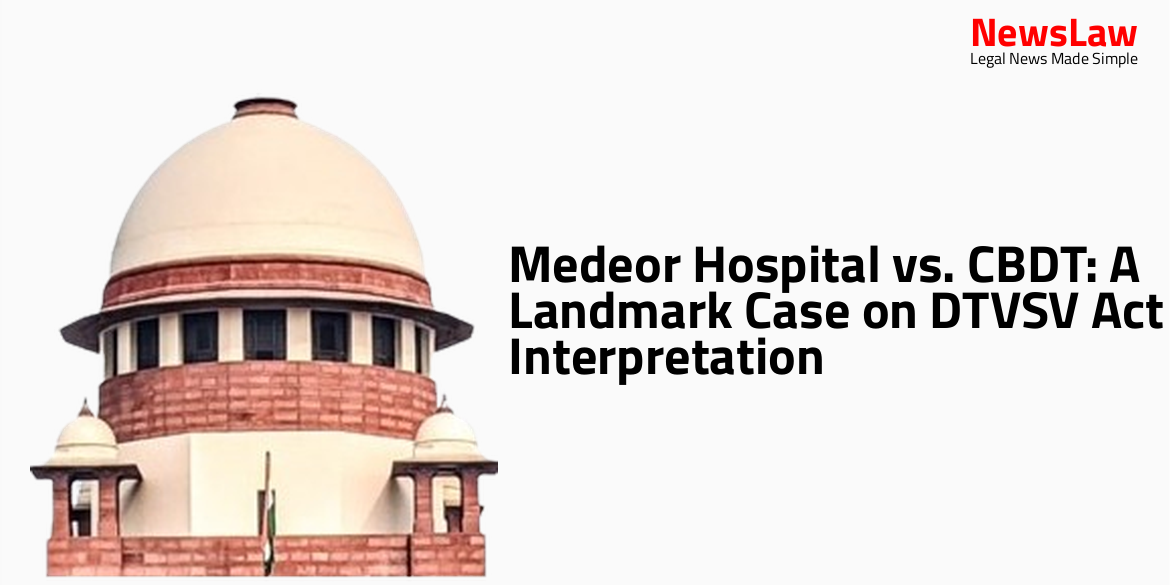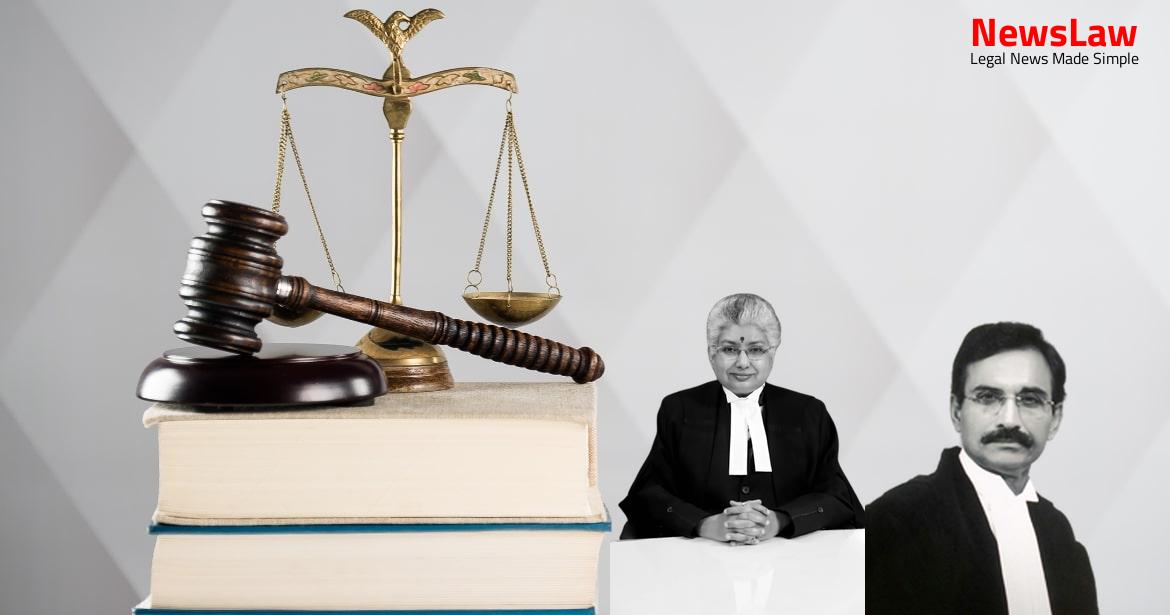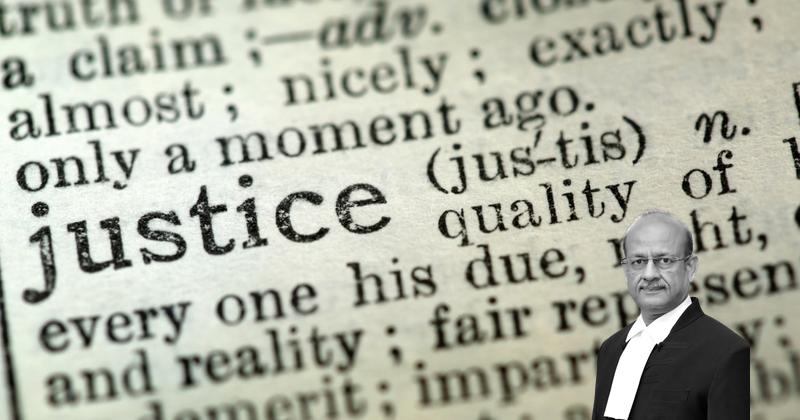The Delhi High Court’s significant ruling in the case of Medeor Hospital vs. CBDT delves into the intricacies of the Direct Tax Vivad Se Vishwas Act and its implications on tax dispute resolutions. This case explores the legislative intent behind the Act, aiming to streamline tax litigation processes and provide clarity and expedited revenue for the government. The interpretation of various provisions under the Act in this judgement paves the way for a comprehensive understanding of tax disputes and settlement mechanisms.
Facts
- No appeal was pending in the assessee‟s case as the CIT(A) disposed of the condonation of delay application on 01.01.2020.
- On 17.03.2020, the DTVSV Act came into force.
- On 23.12.2020, the assessee filed Forms 1 and 2 as per the provisions of the DTVSV Act.
- The Revenue rejected the application on the basis that no appeal was pending on the specified date
- The assessee was deemed ineligible to benefit under the DTVSV Act as per the Revenue’s reasoning
Arguments
- The petitioner drew sustenance from CBDT Circular No 09/2020 dated 22.04.2020 to support their arguments.
- As per the Circular, even if the due date for appeal filing falls after 31.01.2020 and no appeal was filed, the assessee can still benefit from the ‘Vivaad se Vishwas’ scheme, provided the appeal was pending on 31.01.2020.
- On the specified date, no disputed tax arrears existed as per Section 2(1)(j)(B) of the DTVSV Act, as only the question of delay was decided by CIT(A), not the tax decisions of previous cases.
Analysis
- The judgement delves into the intricacies of the Direct Tax Vivad Se Vishwas Act, 2020 (DTVSV Act) and its implications on tax disputes.
- It highlights the legislative intent behind the DTVSV Act, which aims to reduce litigation, provide timely revenue for the government, and offer certainty and resource savings.
- Various provisions and definitions under the DTVSV Act are examined to determine eligibility for settling tax disputes.
- The analysis emphasizes that the Act is remedial and beneficial, aimed at promoting national economic growth and efficient tax planning.
- The significance of pending appeals, revisions, and references in availing benefits under the DTVSV Act is discussed, focusing on the conditions necessary for settlement.
- The judgement underscores the need to resolve pending tax disputes promptly, considering the staggering amount of tax arrears involved.
- Clarifications and interpretations of the DTVSV Act by the Revenue and CBDT are scrutinized in the context of the Act’s objectives and provisions.
- The implications of the Act on various stages of appellate and revisionary processes are explored, emphasizing the need to interpret ambiguities in favor of the assessee.
- The turbulent nature of tax disputes and the benefits of the DTVSV Act in providing a pathway to amicable settlement and relief from prolonged litigation are underlined.
- Ultimately, the judgement reflects on the balance between taxpayer relief, government revenue generation, and the overarching objective of resolving tax disputes efficiently.
- In the case of Medeor Hospital, the Court held that the provisions of the DTVSV Act should be given the widest operation possible.
- The D Act benefits society by reducing litigation, acrimony, and court congestion.
- Remedial statutes aim to bring reform, improve the system, or ameliorate conditions for certain classes of persons.
- The courts should interpret remedial statutes liberally and ensure the intended objectives are met.
- The Supreme Court emphasized the importance of legislative will in interpreting statutes.
- When a section contemplates the pendency of an appeal, the appeal only needs to be pending, without the need for additional qualifications.
- The courts must ensure that the relief intended by the statute is not denied to those it was meant to help.
- Statutes should be construed to give the most complete remedy permitted by the language used.
- The Court should interpret beneficial and remedial legislation liberally and purposively.
- The DTVSV Act aims to end never-ending litigation and recover disputed tax arrears for the Government.
- The payment made after 31st day of March, 2020, but before the notified date by the Central Government will incur a 30% increase in the disputed penalty, interest, or fee.
- The proposed Bill will be enforced upon receiving the President’s assent, with subsequent declaration up to the notified date by the Government.
- Persons categorized as ‘appellants’ include those with pending appeals, writ petitions, special leave petitions, objections before Dispute Resolution Panel, applications for revision, and those affected by directions from the Panel or appellate forums.
- Clarification is provided regarding the exclusion of individuals with filed writ petitions or special leave petitions in tax-related matters from the ‘appellant’ definition.
- Detailed calculations are specified for determining the tax payable by the appellant based on various scenarios like appeals being decided against, directions from the Panel, or pending applications for revision.
- Provisions are made for cases where the Commissioner issues notices of enhancement or disputes regarding tax credits, losses, or depreciations.
- Options are given to appellants on how to include tax-related amounts in the disputed tax or carry forward tax credits, losses, or depreciations as prescribed.
- Specific sections of the Vivad Se Vishwas Act are referenced for clarity and guidance like definitions of ‘appellant’ and ‘specified date’.
- The assessee aims to benefit from the settlement scheme provided by the DTVSV Act.
- Considering that the dispute dates back to AY 2010-11, a significant amount of time and resources have been expended in the ongoing litigation.
- There are no grounds to deny the assessee the opportunity to avail the benefits of the DTVSV Act in the present case.
Decision
- The liberty given to the assessee in accordance with the DTVSV Act and other applicable regulations is confirmed.
- The writ petition is allowed and disposed of, along with any pending applications.
Case Title: PT BUKAKA TEKNIK UTAMA Vs. COMMISSIONER OF INCOME TAX (IT), DELHI – 2 (2024:DHC:4005-DB)
Case Number: W.P.(C)-4222/2021



